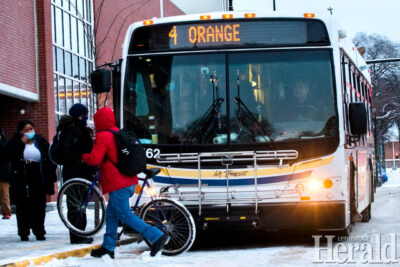Committee defers decision on cityLINK transit report
By Lethbridge Herald on January 6, 2022.
 City transit riders make their way to and from a bus Thursday afternoon at the downtown Park ‘n’ Ride Transit Terminal. Herald photo
City transit riders make their way to and from a bus Thursday afternoon at the downtown Park ‘n’ Ride Transit Terminal. Herald photoAl Beeber – Lethbridge Herald
The Civic Works Standing Policy Committee has deferred until its Feb. 3 meeting a decision whether to recommend city council approve a report on the new cityLINK transit system.
The system is currently working on a six-month trial after being launched last August.
Transit manager Tim Sanderson gave the meeting a detailed report about cityLINK and that report recommends council approve either of two options.
One option is that cityLINK become permanent with quarterly adjustments made to reflect feedback, changing travel patterns and metric indicators.
The other option is for council to restore the $352,000 that was cut from Transit’s annual budget and redirect it to cityLINK which Sanderson said would enable the transit department to build ridership and improve efficiency of the system.
The committee, however, decided to postpone its decision so more public feedback could be received about the new system.
Sanderson said the transit department has received 438 comments about cityLINK with the majority of people concerned about changes to fixed routes.
After hearing from a Lakeview resident’s concerns that the public may not have been aware of Monday’s meeting, chair Belinda Crowson recommended the delay because people may have been caught up by Christmas and didn’t know transit was being addressed Monday. That resident also expressed concerns about bus service between the Lakeview subdivision and the University of Lethbridge, a 15-minute trip by car which takes substantially longer now for transit users in that outside subdivision.
Sanderson told the meeting that on Wednesday, transit will be installing a second hub at the Exhibition grounds so people in Lakeview, which is in a Demand Response Zone, can transfer to Route 4 Orange and be downtown in six minutes.
Lakeview is an area no longer serviced by a regular bus route for reasons including a lack of ridership.
In response to a question from chair Belinda Crowson, Sanderson said Transit didn’t follow the recommendations of a KPMG report which was to go to a strictly on-demand transit service but instead mixed the spirit of that report with directives from city council.
Several key metrics show cityLINK is an improvement over the previous system, Sanderson told the committee, noting that virtually ever transit rider was affected by the change in service which began in August.
On-time performance has improved by 26.07 per cent over the previous system, with Sanderson noting a late bus is preferable to an early one because passengers can still catch the latter. Transit still wants to improve that on-time performance, he said, to meet a goal of 85 per cent on-time buses.
The transfer rate has been reduced by 28.44 per cent, he noted, the objective of Transit being to give more users a one-seat ride to their destinations.
Ridership is also up over the previous system, says the report.
The report also shows that there is an efficiency improvement of 74.25 per cent in customers per revenue hour. This means there are more riders per hour than under the previous system. Sanderson said, as councillor Nick Paladino pointed out, there were buses with only a handful of riders with an average of seven customers per revenue hour before cityLink. That figure now is approaching 15 per hour but Transit wants to achieve the industry standard of 20-25, Sanderson said.
Transit says it believes several adjustments can me made to improve the level of service for many users.
One adjustment includes improving 15-minute peak daytime frequency on 1 Gold and 2 Blue. The report states “as the backbone of the transit network, improved frequency on these routes will result in additional ridership, improved connectivity and improved overall travel time for the majority of transit customers.” It also states addition of this service “will provide dozens of additional transfer connections during the busiest part of the day which will decrease wait time significantly.’
Another includes improving to 20-minute daytime frequency on Route 5 public which will make dozens of additional connections possible on a daily basis, providing a higher level of service for most users in West Lethbridge. This will also “dramatically improve” connectivity between DRZ 101-102 and the University of Lethbridge by increasing transfer opportunities by 33 per cent.
Another option the committee could explore is returning the transit system to its previous setup before cityLink was established. This would involve reverting the entire transit network and include re-establishment of stops and rehiring of drivers. This option, says the report, could result in a 10 per cent decrease in ridership.
Follow @albeebHerald on Twitter
23-22




